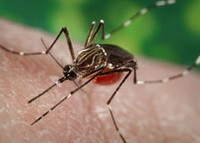 |
| Aedes mosquitoes transmit chikungunya to people.--Courtesy of CDC |
Following recent outbreaks in the Pacific and Caribbean, chikungunya virus has made its way to the U.S.--and drug developers have taken note of its continued spread.
Scientists report today in The Lancet that an experimental vaccine to prevent the mosquito-borne illness elicited neutralizing antibodies in all 25 adult volunteers in a Phase I clinical trial conducted at the National Institute of Allergy and Infectious Diseases, part of the U.S. National Institutes of Health.
Chikungunya virus disease, which causes a fever similar to dengue, first emerged in the U.S. in July. As of Aug. 12, the Centers for Disease Control and Prevention (CDC) has documented a total of 584 cases of chikungunya virus disease in the U.S. No approved vaccines or antiviral treatments are currently available for the disease.
Trial participants received one of three different doses of the vaccine--an initial jab, a second one at four weeks and a third one at 20 weeks after the initial injection. Researchers detected neutralizing antibodies in a majority of the 24 individuals after the first shot. After all three jabs, all dose groups had developed high levels of antibodies.
Back in May at the American Society for Microbiology general meeting, Lyle Peterson, director of the CDC's National Center for Emerging and Zoonotic Infectious Diseases, said that while Middle East respiratory syndrome (MERS) and Ebola don't pose a threat to Americans, it's likely that chikungunya has not yet run its course.
Petersen said the virus has been "taking off by leaps and bounds" since it first emerged in October 2013 in the Caribbean island of St. Martin. More than 570,000 confirmed or suspected cases had been reported throughout the Americas, according to the NIH.
Themis Bioscience and Inviragen are also working on vaccines against the dangerous disease, and Inovio ($INO) is developing a monoclonal antibody to target the virus.
- read the press release
- see the study abstract from The Lancet
- get more from NIH